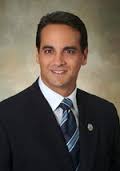An upturn in the replacement cycle (8,990 slots shipped) helped Scientific Games post a 10% revenue increase last quarter. A mix of impairment charges, writedowns and consolidation costs led the mega-supplier to a $128 million loss for the quarter, but  Scientific’s performance still played to rave reviews on Wall Street. “Revenues and EBITDA of $737m and $293m exceeded our $675m and $274m, respectively,” wrote JP Morgan analyst Joseph Greff, noting that the interactive-gaming segment outperformed expectations (up 28%) but cautioning that a China lottery contract had expired. Revenue-participation and leased games were up, and the plurality of new-market growth in the U.S. was attributable to slot routes in Illinois. Given a rather flat replacement cycle in the casino industry, “noted that it expects the business to remain solid and experience modest growth, though quarterly results will likely remain lumpy.”
Scientific’s performance still played to rave reviews on Wall Street. “Revenues and EBITDA of $737m and $293m exceeded our $675m and $274m, respectively,” wrote JP Morgan analyst Joseph Greff, noting that the interactive-gaming segment outperformed expectations (up 28%) but cautioning that a China lottery contract had expired. Revenue-participation and leased games were up, and the plurality of new-market growth in the U.S. was attributable to slot routes in Illinois. Given a rather flat replacement cycle in the casino industry, “noted that it expects the business to remain solid and experience modest growth, though quarterly results will likely remain lumpy.”
As for social gaming, Scientific had placed its Universe brand in 60 casinos. Greff forecast that Scientific’s free cash flow would be plowed into retiring debt, of which it is carrying a hefty $7.8 billion. The company shaved a $27 million sliver off that last quarter. “When a no expectations stock with meaningful financial leverage beats expectations, how they got there sometimes doesn’t matter,” wrote Deutsche Bank‘s Carlo Santarelli, adding that Scientific “handily beat 4Q15 forecasts, but we don’t believe the road ahead is any easier.”
* Gaming legalization continued its improbable march through Georgia this week, as casino enabling legislation passed out of committee. The bill downsized the number of casinos to four (two in Atlanta) and hiked the tax rate from 12% to 20%, in hopes of bringing in $280 million-$300 million of revenue, 90% of which would be dedicated education funding. University of Illinois professor John Kindt was imported to give his familiar anti-casino spiel. “Gambling doesn’t generate economic development. Crime and bankruptcies will ultimately go up as a result,” he warned. The full House has to vote on the bill by Monday or it’s back to Square One.
* Compounding his attempts to derail Wynn Everett, obstructionist Somerville Mayor Joseph Curtatone is now trying to scupper Wynn Resorts‘ planned pedestrian bridge,  severing access between Somerville and Everett. Cutting off his nose to spite his face, Curtatone would interdict foot traffic between the casino and his Assembly Row mixed-use development across the Mystic River. After offering qualified support to the idea of a bridge as a partial alleviation of traffic problems, Curtatone is now singing a different tune. “A footbridge would benefit Steve Wynn and Steve Wynn only. Wynn is looking to tap into the success of Assembly Row to get more people to his craps table,” warbled Curtatone.
severing access between Somerville and Everett. Cutting off his nose to spite his face, Curtatone would interdict foot traffic between the casino and his Assembly Row mixed-use development across the Mystic River. After offering qualified support to the idea of a bridge as a partial alleviation of traffic problems, Curtatone is now singing a different tune. “A footbridge would benefit Steve Wynn and Steve Wynn only. Wynn is looking to tap into the success of Assembly Row to get more people to his craps table,” warbled Curtatone.
When Hizzoner’s office was asked to explain the volte-face, a Somerville spokeswoman said, “We risk Assembly Row being turned into overflow parking for the casino, pulling even more casino traffic through our roadways and exposing Assembly Row businesses to the well-documented adverse effects that casinos have been shown to have on nearby businesses.” It seems like every time Wynn extends the hand of friendship to Massachusetts, it gets slapped away.
* In one of his first interviews as president of Sands China, Wilfred Wong performed  impressively. “It’s scary that Macao’s gross gaming revenue has seen declines for 20 months but I have confidence the drop could end in February,” he said. He added that the company “won’t complain” if it only gets 250 table games, a dramatic contrast to Steve Wynn‘s noisy recalcitrance on the issue (causing Wynn to have to remove his foot from way down in his mouth). To boost interest in The Parisian, Sands may open its faux Eiffel Tower ahead of the rest of the megaresort, a canny marketing move. Wong’s boss, Sheldon Adelson, continues to play his cards just right in the Macao market.
impressively. “It’s scary that Macao’s gross gaming revenue has seen declines for 20 months but I have confidence the drop could end in February,” he said. He added that the company “won’t complain” if it only gets 250 table games, a dramatic contrast to Steve Wynn‘s noisy recalcitrance on the issue (causing Wynn to have to remove his foot from way down in his mouth). To boost interest in The Parisian, Sands may open its faux Eiffel Tower ahead of the rest of the megaresort, a canny marketing move. Wong’s boss, Sheldon Adelson, continues to play his cards just right in the Macao market.
* Resorts Atlantic City will finally deploy PokerStars in March, after additional testing, offering a full repertory of casino games. Given PokerStars’ brand equity, it will be interesting to see how dramatically this reshapes the New Jersey online-gaming picture.
* Casinos in Thailand could be a $2.8 billion boon in tax revenues, according to a new study. However, the Thai government remains opposed to their legalization.


I really like their WMS slots, so many great titles out now.